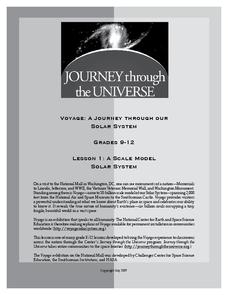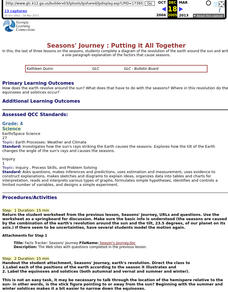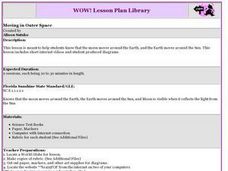Curated OER
Choose the Correct Homophone II
Homophones are tough! Identify different homophones and how they're different. Common ones like son and sun and plain and plane are included. Some uncommon ones are also included, like bridal and bridle.
University of Colorado
The Jovian Basketball Hoop
Can you listen to Jupiter on a simple radio? Turns out the answer is yes! The resource instructs scholars to build a simple radio to pick up the radio waves created when the charged particles from the sun hit Jupiter's magnetic...
Curated OER
May the Force be with You -- All about Force and Gravity
Here is a fabulous set of teacher's notes that will make your next hands-on gravity and force lab fun and interesting. These notes provide you with three activities that allow children to make and test hypothesis regarding force,...
Journey Through the Universe
A Scale Model Solar System
Between the time scientists discovered Pluto and reclassified it as a dwarf planet, it did not even make one full revolution around the sun. In two activities, scholars investigate scale models and their properties. Pupils find that it...
K5 Learning
Why Does the Ocean have Waves?
Six short answer questions challenge scholars to show what they know after reading an informational text that examines waves—what they are, what causes them, and how different Earth factors affect their size and strength.
American Museum of Natural History
What is Marine Biology?
A marine environment covers the majority of the earth but is arguably the least understood. Teach young scientists about the characteristics of oceans and ocean species using an interactive online lesson. The in-person or remote learning...
Curated OER
Modeling the Solar System
Students build a scaled model of the solar system. For this space science lesson, students arrange them according to their distances from the sun. They analyze each planet's unique features such as density and relative gravity.
Curated OER
El Niño ~ The Return of El Niño
El Niño sure creates a stir when it comes around! Why not stir up your earth science class with this data analysis activity that examines the temperature and precipitation over the 2002-2003 water year. A tracking chart is provided...
K12 Reader
What’s the Forecast?
A reading comprehension passage is illustrative for both language arts and earth science skills. Using context clues, learners find out how to predict the weather using various tools. They then answer five reading questions about what...
Core Knowledge Foundation
Weather or Not, Seasons Change
Embark on a year long investigation of the seasons with this 10-lesson earth science unit. After being introduced to different types of weather and the tools used to measure it, young scientists perform fun hands-on activities that...
NASA
Exploring Data
Bring the sun to your class! Young scholars analyze actual solar wind data in the second lesson of a five-part series. Their analysis includes speed, temperature, and density data.
101 Questions
Neptune
Examine an innovative approach to a large-scale model. Pupils across the state of Maine teamed up to create a model of the solar system that spans 40 miles. Put thinking skills to work within your classes as they make the calculations to...
Curated OER
How Far Away is SOHO?
Students create a scale model of the Earth and the sun that demonstrates where the SOHO satellite is in relation to the Earth.
Curated OER
Adding the Moon: Using a Playground Model to Explore the Movement of the Sun, Earth, and Moon
Learners experience the rotation of the Earth and the Moon, and the revolution of the Moon around the Earth using a playground model.
Curated OER
Seasons' Journey : Putting it All Together
Third graders complete a diagram of the revolution of the earth around the sun and write a one paragraph explanation of the factors that cause seasons.
Curated OER
Bouncing Sunlight
Third graders use flashlights and balls to demonstrate how the light bounces off of the sun and reflects onto the moon. They record their observations in a journal.
Curated OER
Soaring Through Space With a Kid Pix Slide Show
First graders create a slide show on Kid Pix about space. In this space lesson plan, 1st graders will explore the earth, sun, moon, and planets. After exploring their motions and locations around the sun, they create a 4 page slide show...
Curated OER
Shadow Trackers: From Photography to Writing
Students explore the rotation of the earth. In this science instructional activity, students view photos of various places around the world. Students conduct an experiment in which they can see how the earth's rotation creates shadows on...
Curated OER
Moving in Outer Space
Students participate in a lesson that demonstrates the concepts of rotation and revolution as they pertain to the Sun, the moon, and the Earth. They examine the relative sizes of each. They watch a computer based movie at a subscription...
Curated OER
Learning Lesson: Moonlight Serenade
Learners complete experiments as they act as the earth. They observe how different angles affect the phases of the moon seen by us. They discuss the differences in light and dark.
Curated OER
The Sun
In this sun worksheet, students learn that the sun is a large star and recognize it's size in relation to the Earth. Students color the sun yellow.
Curated OER
Parametric Functions and Substitutions
In this solar winds activity, students determine the strength of magnetic storms in terms of the size of the change they make in the Earth's magnetic field. This learning exercise has 3 problems to solve.
Curated OER
Don't Marry the Mole!
Third graders examine the power of solar energy. In groups, they create their own pizza box solar oven to discover the power of the sun and how it is a source for heat and light. To end the lesson, they use the internet to examine...
Other popular searches
- Earth and the Sun
- Earth Orbit the Sun
- Earth Science; The Sun
- The Sun Earth Moon System
- Earth Orbiting the Sun
- Earth Science the Sun
- Earth's Orbit Around the Sun
- Earth Orbits the Sun

























